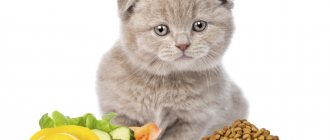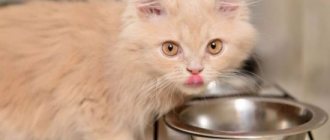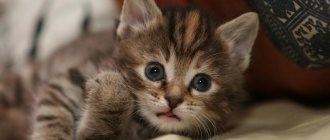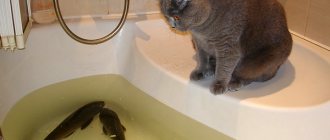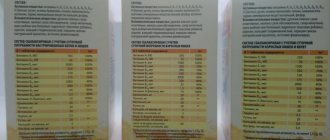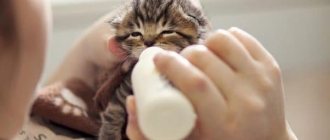12532Administration
2
British cats are affectionate and kind animals. They are sociable, love company, and get along well with children. But they don't like too much attention. Often goes to a new home, a British kitten at 2 months. Such an amazing age to have a baby.
He is old enough to start learning to eat on his own. It's time to take up his education, accustom him to the tray, explain what is possible and what is not. But do not forget that the British cat is still very small and you need to correctly and responsibly approach the issue of its further development as a full-fledged, adult cat.
Nutritional features of a 2 month old British kitten
Question: “What should I feed a British kitten for 2 months?” is very relevant for the caring owners of the child, because the kitten has just been weaned from its mother’s milk and given into adulthood. You need to start feeding your baby gradually. First comes bait 6-8 times a day, in small portions.
The diet of a British two-month-old kitten should be as follows: tender beef meat, milk, cottage cheese in its pure form, cream, cereals with milk, special canned food for kittens designed for its age.
Photo of a British baby at 2 months © shutterstock
For further transfer to dry food, 100% wet food is used, with an admixture of dry food, so that the Briton gets used to the taste of such a menu. It is best to feed British kittens for 2 months at the same time. Don’t forget, it’s important to always have fresh water near the bowl. Food should be 27-30 degrees.
4-5 months
The following changes await the animal:
- Slow development - the baby becomes a teenager.
- Baby teeth begin to be replaced by permanent teeth.
Since the “British” is not developing as actively as before, the number of his meals is reduced to 3-4 times.
Rules
Don’t throw the beef in one solid piece, hoping that the predator will figure out what to do with it. Raw beef needs to be cut into small pieces or put into a meat grinder. Before this, it must be deep frozen for 24 hours, or it must be doused with boiling water. For a 2-month-old British kitten, choose high-quality food.
It is advisable that the canned food and food be from the same company. This way he will get used to the food faster.
What should not be included in the diet of British kittens at 2 months old? Also a relevant question. Must not be:
- Pork (fatty meat, contains a lot of bacteria, difficult to digest);
- Fish from the river (lots of small bones, the question of the purity of the water in which it was found, feeding raw fish is generally prohibited);
- Onions (dangerous for cats in any form);
- Sweets (we never sweeten food);
- Salty (we never salt food);
- Smoked meats;
- Dry food (they like it, but it is very harmful at this age in its pure form).
Weight standard
To be sure that your pet is growing and developing harmoniously, you can check the weight chart that is relevant for this breed. The standard provides for the body weight of a newborn kitten for a boy to be in the range of 70-140 g, for a girl - from 60 to 140 g. In the first week, these parameters are 40-260 g and 110-250 g, respectively, in two weeks - 340-400 and 150-360 g, at three weeks – 400–630 and 210–420 g, at four weeks – 550–740 and 250–600 g.
A two-month-old male weighs 1–1.7 kg, a female – from 450 to 900 g. A three-month-old pet should gain 1.5–2.5 kg, and a girl – 1–1.5 kg. A four-month-old boy weighs from 2.1 to 3.9 kg, and a girl weighs 1.7–2.4 kg. At five months, a cat weighs 2.6–4.3 kg, and a female cat weighs 2.2–2.9 kg. Body weight at six months is prescribed in the range of 3–5.4 kg and 2.3–3.6 kg, respectively, at seven months – 3.3–5.6 and 2.4–3.9 kg, at eight months – 3 .5–6 and 2.5–4.1 kg, at nine months – 3.8–6.4 and 2.5–4.3 kg, at ten months – 4.1–6.7 and 2.5 –4.4 kg, at eleven months – 4.3–6.8 and 2.5–4.5 kg.
At 1 year, the male has a body weight in the range of 4.5–7 kg, and the female – from 2.5 to 4.6 kg. The standard provides for the weight of a British cat, which is determined by one year of age, to be in the range of 2.5–5.5 kg, while an adult male reaches 4.5–8 kg. For castrated and sterilized animals, the parameters are different: the weight of a male is 4.5–9.5 kg, and that of a female is from 2.5 to 6 kg.
Necessary supplies for a new family member
To make your little one feel comfortable in your home, you need to carefully prepare. Buy for him:
- a house where he will sleep and relax if he wants to be alone;
- bowls for water and food;
- toys;
- pet carrier;
- buy food;
- tray and filler for it.
It is better to take plastic carriers. Despite the fact that the plastic one is very bulky during transportation, it holds its shape perfectly and if something happens, the animal will be comfortable there.
So that the British cat has his own corner for relaxation, buy him a sleeping place, or make it yourself. Take an unnecessary box from under furniture, equipment (in terms of volume it should allow the cat to lie stretched out). Make a hole for the entrance, cover the bottom of the box with an old jacket, a pillow, and place it in a cozy corner.
There should be at least two bowls. For water and food. Keep the water fresh.
Buy a special post where you can sharpen the claws. If you have an old frame or piece of wood, make it available to the kitten.
The importance of water in the British diet
For British cats, and even more so kittens, water is an important substance necessary for the normal functioning, growth and development of the body. It is required in moderation
If wet food was chosen for feeding, then less water will be needed.
Main conditions:
- constant access to a bowl of water;
- keeping it clean;
- change the liquid every day or more often if pieces of food or other objects get into the container;
- placing a bowl of water separately from the container with food.
Ordinary tap water is suitable for drinking, as long as it has no foreign odor or taste. It happens that a cat refuses to drink tap water, then filtered or purchased drinking water is taken.
Getting used to a new place and training to a tray
At first, the kitten will miss its previous home, meows at night, pick it up and stroke it, talk to it. Caring for British kittens at 2 months is exactly like this. At night, you can put him on a warm heating pad, wrapping it in a towel (this will remind him of his mother or the presence of other kittens nearby). Take your time, let the Brit get comfortable.
© shutterstock
If the animal was purchased from a nursery, they are often already litter box trained. If not, then it won't be difficult. After feeding, take your Brit to the toilet. It is better to fill the tray with wood filler. He will like it there and will quickly remember where to go. The tray should always be clean, this is the key to avoiding embarrassment. If there is an embarrassment, then it is worth punishing the kitten.
You shouldn't hit the kitten; a loud sound or clap is enough to make it scared; you can spray it with water.
This will develop a conditioned reflex and after the third time the kitten will understand that this is not worth doing. Never allow a cat's unacceptable behavior to go unpunished.
Raising a cat
If you don't want your pet to steal food from your table, tear off all your furniture and wallpaper, and shit anywhere, train him. You need to set a task for yourself:
- Do not train your cat to ask for food from the table or eat from human dishes.
- Do not allow the owner to scratch or bite.
Don't forget to check your kitten's ears every day.
When prohibiting anything (sharpening your claws on furniture, hanging on curtains or wallpaper, going to the toilet in the wrong places, gnawing indoor flowers, etc.), you can use a few tips from experienced British owners:
- do not shout or hit the animal - the cat is offended and harbors a grudge, and subsequently he can take revenge;
- you can unexpectedly spray water from a spray bottle on a mischievous cat;
- loudly and suddenly clap your hands when the cat intends to commit an act prohibited by the owner;
- Spray the area where the cat is sharpening its claws or going to the toilet with an air freshener with a bright citrus scent.
Caring for and raising British kittens is not difficult, as they are well trained. As a result of the educational process, the cat must understand the word “no”. It must be said while looking into the animal’s eyes - then the pet understands who is in charge in the house.
Caring for and raising British kittens is simple
Meeting all family members
Children love animals very much and show great interest in them. Tell your child how to properly pick up a cat, how he shows his dissatisfaction by wagging his tail, and that you shouldn’t squeeze him too hard and drag him around the house.
Perhaps you have another animal at home? Then you should initially not introduce the new guy to the old one for a couple of days. The new one will still get used to it, but the old resident will already feel the emergence of a new one. At the same time , pay sufficient attention to both the first and second pet so that jealousy does not arise. Arrange a meeting with them in a few days. They need to be in the room at this moment, and each of them should have a place to retreat, in case something happens. If an undesirable reaction occurs, limit contact with the animals for a couple of days and introduce them again.
Safety first
Take care of the safety of the chosen toy for your kitten, because they are like children. There should be no parts that a Briton can swallow: excess fluff, elastic, shiny, small beads. Toys should be soft and made of good fabric. Avoid purchasing hard or sharp toys.
Make sure everything in the house is safe for the kitten:
- Close access to all the cracks where a Briton can climb in and not get out until he grows up;
- Keep the bags out of the reach of kittens, because they are such little naughty creatures, while playing, they can get stuck there and suffocate;
- Cover your trash at night. A British person will not be tempted to find and eat a sausage roll;
- Place nets on the windows so that the Briton does not stare at the bird and fly away with it;
- Don’t leave threads, raindrops, or balls in a place accessible to a Briton; he can easily eat it all;
- While the Briton is very small, be careful. He remembers that you may not notice him, step on him, sit down, lie down;
- Before the first vaccination, try to limit your pet’s contact with other animals and various objects from the street;
- Do not leave chemicals or detergents open or unattended;
- It is better to keep dry food in the pantry away from the cat.
Animal hygiene and vaccination
Britons also need to be brushed regularly. A rubber, oval brush is perfect for this task. They will not only remove excess hair, but also give a light massage and remove static tension from the British dog’s coat. Their fur is not long, it does not gather in lumps, and there are no difficulties in grooming.
© shutterstock
In winter, you need to touch the wool with a wet hand to create moisture, because... The air is especially dry during the heating season, and the wool fades against its background.
You can bathe your British cat once every six months, with a special shampoo. Water 40 degrees. After bathing the cat, wrap it in a towel and dry it, making sure that it does not catch a cold. Check the ears every week for cleanliness; if there is excess wax, carefully remove it with a bath stick soaked in hydrogen peroxide.
How to properly care for babies?
In the first days, newborn Scottish Fold kittens are completely helpless. The photo shows them cuddling up to their mother cat.
But every day they become more and more independent:
- On the 10th day, kittens begin to see the world around them and crawl;
- Starting from the fourth week, kittens can eat independently, and not just suck milk;
- When babies turn one month old, they begin to make forays out of the box. It is at this time that you should start training them to use the tray.
Kittens should be allowed to get used to grooming procedures from an early age so that an adult cat can take the manipulations calmly:
- The kitten's fur is combed with a special brush every 2-3 days. This procedure can be performed using a wide-tooth comb or a natural bristle brush.
- You should wash your kitten only when it gets dirty. It is not recommended to bathe kittens and adult cats more than once a month.
- Kittens are washed using special shampoos that carefully care for their fur, and also, if necessary, correct the color of their fur coat.
- To cut your kitten's nails, you need to sit him on your lap. Taking the paw in your hand, you should press slightly on the pad and trim the claws, avoiding the blood vessels. It is important that the kitten gets used to cutting its claws from childhood, then it will not resist when it grows up.
- Like kittens of other breeds, Scottish Folds require regular cleaning of their ears and eyes.
It is worth noting that Scottish Fold cats are extremely smart from the first days of their lives. They are very smart, learn quickly, and immediately master the litter box. The Scots are great entertainers and can perfectly entertain themselves, but at the same time, they are very attached to their owners.
Vaccinations
Do not forget that the British breed was bred almost artificially. Animals of this breed have weak immunity. Don't neglect vaccinations ! In fact, this is very important. Already in the period from two to three months, a kitten can be vaccinated. This will protect him from many diseases. Before visiting the veterinarian, give your pet an anthelmintic drug ten days in advance; if after ten days no helminths are found, then you can safely visit the veterinarian.
After the first vaccination, the second one is given, exactly twenty-one days later. The same vaccine is administered, and after fourteen days immunity is developed. Repeated vaccinations are recommended every year.
7-12 months
Further life of the animal:
- 7 months Start of puberty, initial molt.
- 8 months Sterilization, castration if necessary.
- 10 months Becomes sexually mature, but not yet ready for mating.
- 11 months The animal is transferred to adult food, the number of meals is reduced to 2-3 times.
A one-year-old "British" is already considered an adult. But his physical development continues until 2-2.5 years. The animal becomes larger, more massive, “seasoned”.
British cat at 9 months:
British yearling adult cats:
